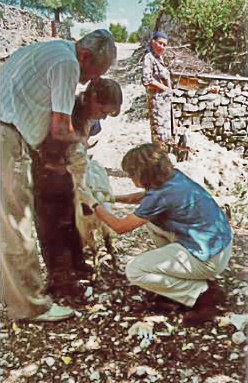Jennifer McQuiston (DVM ’97, MS ’98): Infectious disease and romance: Unlikely duo works for Dr. McQuiston
Profile by Michael Sutphin
November 27, 2013

Dr. Jennifer McQuiston (DVM ’97, MS ’98) has never been one to limit her options.
Raised in a family of educators, she appreciated both English and science in high school but decided to focus on the latter in college. Today, McQuiston works as an epidemiologist for the U.S. Centers for Disease Control (CDC). She is also a New York Timesand USA Today bestselling author of two romance novels — with a third set for publication next year.
“In retrospect, I was always more of an English student than a science student in high school, even though I studied and enjoyed both,” said McQuiston, who earned her doctor of veterinary medicine degree from the Virginia-Maryland College of Veterinary Medicine in 1997 and received the college’s Outstanding Recent Alumna Award in 2008.
As the epidemiology activity leader for the CDC’s Rickettsial Zoonoses Branch, McQuiston has made a career out of investigating and controlling outbreaks of animal diseases that threaten human health. She works in the National Center for Emerging and Zoonotic Infectious Diseases in Atlanta where she lives with her husband, John McQuiston, a CDC microbiologist who earned a master’s degree at the veterinary college in 1992.
Although romance novels may seem an unlikely choice for the hard-core scientist, McQuiston admits that her fondness for the genre stems purely from selfish reasons. “I read so many scientific texts and peer-reviewed manuscripts that, when I reach for a book for pleasure, I want escapism,” said the self-described “voracious reader.”
McQuiston penned the Victorian-era historical romances What Happens in Scotland and Summer is for Lovers in 2013. They have topped bestseller lists and garnered attention for McQuiston’s unique settings.
“Most Victorian-era historical romances are set in London, so I am getting a lot of attention for choosing other locations,” she explained. The final book in the trilogy, Moonlight on My Mind, takes place in the Yorkshire countryside and will be available in the spring of 2014.
These are not, however, McQuiston’s only attempts at writing. Her first attempted romance novel followed the life of John Snow, an English physician who discovered the source of an 1854 cholera outbreak in London and later became the father of epidemiology. As she still does when working on a novel, McQuiston woke up at 4 a.m. — before her daughters, now ages 8 and 11, got out of bed — to begin writing. That novel never made it into print, but McQuiston continued writing and, after completing her fifth novel, found a publisher.
McQuiston has been an early riser since her college days. She earned a bachelor’s degree in biology at Virginia Tech in 1993 and completed both a doctor of veterinary medicine and a master’s degree in molecular biology from the college in 1997 and 1998, respectively. At the start of her professional training, McQuiston thought she was on track to become a pharmaceutical researcher, but an externship at the CDC changed her mind.
Instead of laboratory or office work, the CDC sent McQuiston, then a fourth-year veterinary student, with a team responding to a flu outbreak in New York City. She visited nursing homes in the city and the surrounding area to evaluate whether senior citizens who had received a recalled flu vaccine needed additional protection against the virus.
“It all clicked with that once experience,” she said. “I was fortunate that I had already made plans for an alternative career path with a set of skills that would be useful as an epidemiologist.”
After graduating with dual degrees from the veterinary college, McQuiston signed up for the CDC’s Epidemic Intelligence Service, a two-year program that trains epidemiologists to conduct disease outbreak investigations in the field. The CDC sent McQuiston back to Manhattan on Sept. 11, 2001, to assist with the emergency response following the World Trade Center attacks. According to an account in the spring 2004 issue of the Virginia Tech Magazine, she was on a plane heading to New York only four hours after the attacks and remained there for six weeks. She tracked the subsequent anthrax attacks and monitored unusual symptoms among those affected by the attacks.
A Diplomate of the American College of Veterinary Preventive Medicine, McQuiston has received a number of national awards for her work, including the Daniel E. Salmon Award from the National Association of Federal Veterinarians and the James H. Steele Award from the CDC. She now leads a team at the center that investigates outbreaks of rickettsial diseases — those carried by ticks, fleas, and lice — and credits her recent work to control Rocky Mountain spotted fever on American Indian reservations in Arizona as one of her most rewarding experiences.
“The reservations have socioeconomic and infrastructure challenges, but the people are absolutely committed to protecting their children,” said McQuiston, who is also a captain in the U.S. Public Health Service Commissioned Corps.


Brown dog ticks carry the fever-inducing disease that kills seven out of 100 infected people, mostly children. McQuiston led a team that introduced a pilot program called the Rocky Mountain Spotted Fever Rodeo, an integrated pest management program that involves providing every tribal dog with a long-lasting tick collar and spraying yards and houses at regular, strategic intervals. This has reduced the number of dogs with ticks from 63 percent to less than 1 percent.
“We have not only helped reduce the risk of people contracting Rocky Mountain spotted fever, but also helped with the health of all dogs on the reservation,” she said.
When McQuiston realized that the uncontrolled dog population on the reservation was a central factor in the ongoing outbreak, she gave one of her college mentors a call. Dr. Kevin Pelzer, professor of production management medicine in the Department of Large Animal Clinical Sciences, arranged for two groups of veterinary students to visit the reservation in the summer of 2012 to help with a focused spay and neuter program in the study community.
During her second year of veterinary school, McQuiston took a public health class taught by Pelzer, who at the time was one of the only faculty members at the college with a background in epidemiology. “He was a dynamic teacher who prefaced every topic of discussion with a funny story,” she said.
Pelzer encouraged McQuiston to pursue a career in epidemiology after he heard about her positive experiences at the CDC. She now makes every opportunity to return the favor to veterinary students who come through her door.
“Whenever possible, I try to mentor students from the veterinary college who wish to participate in externships at the CDC,” she explained.
McQuiston hopes that these students will gain eye-opening experiences about the possibilities of a veterinary career, much like she did during her externship there.
Who knows, some of the students may even become fans of her other work as well.


